Home | Category: The Crusades
MUSLIM DESCRIPTIONS OF THE CRUSADERS
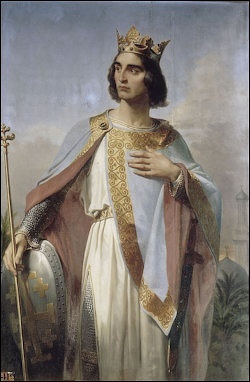
Baldiwin I of Jerusalem
Usamah (1095-1188), was a Muslim warrior and courtier, who fought against the Crusaders with Saladin. As a resident of the area around Palestine, he lived among Crusaders and their families and had a chance to befriend a number of them. His autobiography dates from around 1175, not long before Saladin and the Muslims retook Jerusalem. “Franks” is the name by which many Muslims referred to the Crusaders
On the Franks,Usmah Ibn Munqidh wrote in his Autobiography: “Mysterious are the works of the Creator, the author of all things! When one comes to recount cases regarding the Franks, he cannot but glorify Allah (exalted is he!) and sanctify him, for he sees them as animals possessing the virtues of courage and fighting, but nothing else; just as animals have only the virtues of strength and carrying loads. I shall now give some instances of their doings and their curious mentality.
“In the army of King Fulk, son of Fulk, was a Frankish reverend knight who had just arrived from their land in order to make the holy pilgrimage and then return home. He was of my intimate fellowship and kept such constant company with me that he began to call me "my brother." Between us were mutual bonds of amity and friendship. When he resolved to return by sea to his homeland, he said to me: ‘My brother, I am leaving for my country and I want you to send with me thy son (my son, who was then fourteen years old, was at that time in my company) to our country, where he can see the knights and learn wisdom and chivalry. When he returns, be will be like a wise man.
“Thus there fell upon my ears words which would never come out of the head of a sensible man; for even if my son were to be taken captive, his captivity could not bring him a worse misfortune than carrying him into the lands of the Franks. However, I said to the man: ‘By thy life, this has exactly been my idea. But the only thing that prevented me from carrying it out was the fact that his grandmother, my mother, is so fond of him and did not this time let him come out with me until she exacted an oath from me to the effect that I would return him to her. Thereupon he asked, "Is thy mother still alive?" "Yes." I replied. 'Well," said he, "disobey her not."
Islamic History: Islamic History Resources uga.edu/islam/history ; Internet Islamic History Sourcebook fordham.edu/halsall/islam/islamsbook ; Islamic History friesian.com/islam ; Islamic Civilization cyberistan.org ; Muslim Heritage muslimheritage.com ; Brief history of Islam barkati.net ; Chronological history of Islam barkati.net
Muslims and Crusaders Living Together
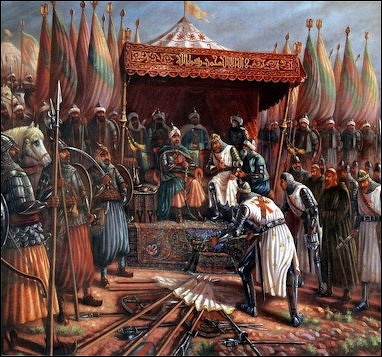
Saladin with Christians
Usmah Ibn Munqidh wrote in his Autobiography: “Among the Franks are those who have become acclimatized and have as- sociated long with the Muslims. These are much better than the recent comers from the Frankish lands. But they constitute the exception and cannot be treated as a rule.
“Here is an illustration. I dispatched one of my men to Antioch on business. There was in Antioch at that time al-Ra'is Theodoros Sophianos, to whom I was bound by mutual ties of amity. His influence in Antioch was supreme. One day he said to my man, "I am invited by a friend of mine who is a Frank. Thou shouldst come with me so that thou mayest see their fashions." My man related the story in the following words:
“I went along with him and we came to the home of a knight who belonged to the old category of knights who came with the early expeditions of the Franks. He had been by that time stricken off the register and exempted from service, and possessed in Antioch an estate on the income of which he lived. The knight presented an excellent table, with food extraordinarily clean and delicious. Seeing me abstaining from food, he said, "Eat, be of good cbeer! I never eat Frankish dishes, but I have Egyptian women cooks and never eat except their cooking. Besides, pork never enters my home." I ate, but guardedly, and after that we departed.
“As I was passing in the market place, a Frankish woman all of a sudden hung to my clothes and began to mutter words in their language, and I could not understand what she was saying. This made me immediately the center of a big crowd of Franks. I was convinced that death was at hand. But all of a sudden that same knight approached. On seeing me, he came and said to that woman, "What is the matter between you and this Muslim?" She replied, "This is he who has killed my brother Hurso." This Hurso was a knight in Afiimiyah who was killed by someone of the army of Hamah. The Christian knight shouted at her, saying, "This is a bourgeois (i.e., a merchant) who neither fights nor attends a fight." He also yelled at the people who had assembled, and they all dispersed. Then he took me by the hand and went away. Thus the effect of that meal was my deliverance from certain death.*
Crusader Medicine: Cure for Leg Abscesses: Chop off the Leg
Usmah Ibn Munqidh wrote in his Autobiography: “The lord of al-Munaytirah wrote to my uncle asking him to dispatch a physician to treat certain sick persons among his people. My uncle sent him a Christian physician named Thabit. Thabit was absent but ten days when be returned. So we said to him, "How quickly has thou healed thy patients!" He said:
“They brought before me a knight in whose leg an abscess had grown; and a woman afflicted with imbecility. To the knight I applied a small poultice until the abscess opened and became well; and the woman I put on diet and made her humor wet. Then a Frankish physician came to them and said, "This man knows nothing about treating them." He then said to the knight, "Which wouldst thou prefer, living with one leg or dying with two?" The latter replied, "Living with one leg." The physician said, "Bring me a strong knight and a sharp ax." A knight came with the ax. And I was standing by. Then the physician laid the leg of the patient on a block of wood and bade the knight strike his leg with the ax and chop it off at one blow. Accordingly he struck it-while I was looking on-one blow, but the leg was not severed. He dealt another blow, upon which the marrow of the leg flowed out and the patient died on the spot.
“He then examined the woman and said, "This is a woman in whose head there is a devil which has possessed her. Shave off her hair." Accordingly they shaved it off and the woman began once more to eat their ordinary diet-garlic and mustard. Her imbecility took a turn for the worse. The physician then said, "The devil has penetrated through her head." He therefore took a razor, made a deep cruciform incision on it, peeled off the skin at the middle of the incision until the bone of the skull was exposed and rubbed it with salt. The woman also expired instantly. Thereupon I asked them whether my services were needed any longer, and when they replied in the negative I returned home, having learned of their medicine what I knew not before.
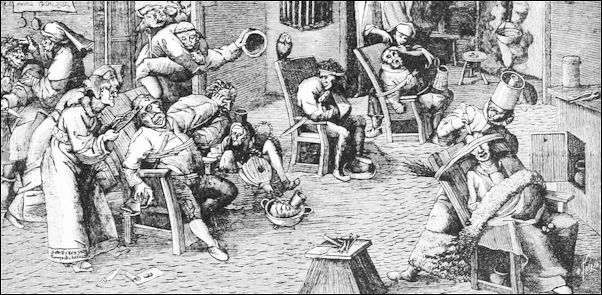
medieval medicine: stones in the head by Brueghel the Elder
“I have, however, witnessed a case of their medicine which was quite different from that. The king of the Franks bad for treasurer a knight named Bernard, who (may Allah's curse be upon him!) was one of the most accursed and wicked among the Franks. A horse kicked him in the leg, which was subsequently infected and which opened in fourteen different places. Every time one of these cuts would close in one place, another would open in another place. All this happened while I was praying for his perdition. Then came to him a Frankish physician and removed from the leg all the ointments which were on it and began to wasb it with very strong vinegar. By this treatment all the cuts were healed and the man became well again. He was up again like a devil. Another case illustrating their curious medicine is the following: In Shayzar we had an artisan named abu-al-Fath, who had a boy whose neck was afflicted with scrofula. Every time a part of it would close, another part would open. This man happened to go to Antioch on business of his, accompanied by his son. A Frank noticed the boy and asked his father about him. Abu-al-Fath replied, "This is my son." The Frank said to him, 'Wilt thou swear by thy religion that if I prescribe to you a medicine which will cure thy boy, thou wilt charge nobody fees for prescribing it thyself? In that case, I shall prescribe to you a medicine which will cure the boy." The man took the oath and the Frank said:
“Take uncrushed leaves of glasswort, burn them, then soak the ashes in olive oil and sharp vinegar. Treat the scrofula with them until the spot on which it is growing is eaten up. Then take burnt lead, soak it in ghee butter and treat him with it. That will cure him. “The father treated the boy accordingly, and the boy was cured. The sores closed and the boy returned to his normal condition of health. I have myself treated with this medicine many who were afflicted with such disease, and the treatment was successful in removing the cause of the complaint.”
Relations Between Crusader Men and Women
Usmah Ibn Munqidh wrote in his Autobiography: “The Franks are void of all zeal and jealousy. One of them may be walking along with his wife. He meets another man who takes the wife by the hand and steps aside to converse with her while the husband is standing on one side waiting for his wife to conclude the conversation. If she lingers too long for him, he leaves her alone with the conversant and goes away.
“Here is an illustration which I myself witnessed: When I used to visit Nablus, I always took lodging with a man named Mu'izz, whose home was a lodging house for the Muslims. The house had windows which opened to the road, and there stood opposite to it on the other side of the road a house belonging to a Frank who sold wine for the merchants. He would take some wine in a bottle and go around announcing it by shouting, "So and so, the merchant, has just opened a cask full of this wine. He who wants to buy some of it will find it in such and such a place." The Frank's pay for the announcement made would be the wine in that bottle. One day this Frank went home and found a man with his wife in the same bed. He asked him, "What could have made you enter into my wife's room?" The man replied, "I was tired, so I went in to rest." "But how," asked he, "didst thou get into my bed?" The other replied, "I found a bed that was spread, so I slept in it." "But," said be, "my wife was sleeping together with you!" The other replied, "Well, the bed is hers. How could I therefore have prevented her from using her own bed?" "By the truth of my religion," said the husband, "if thou shouldst do it again, thou and I would have a quarrel." Such was for the Frank the entire expression of his disapproval and the limit of his jealousy. . . .
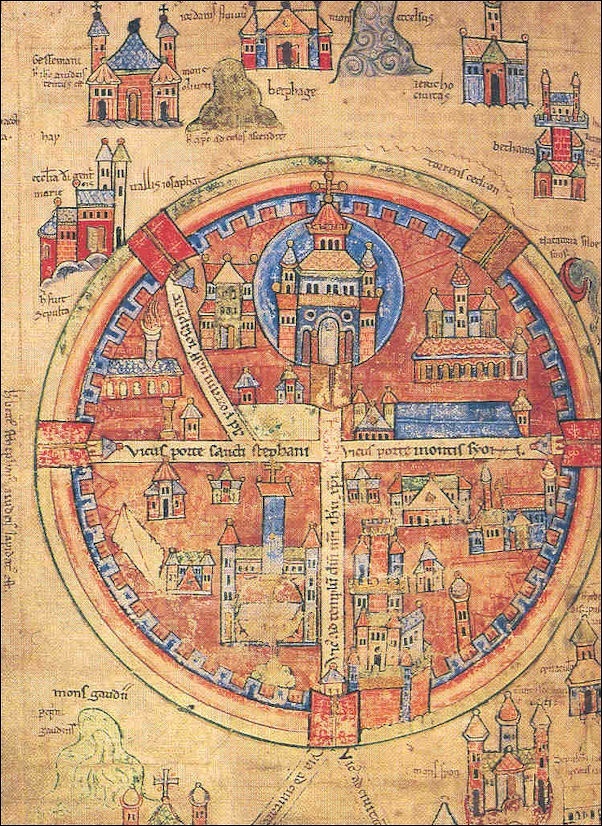
Upsala Map of Jerusalem
“Another illustration: I entered the public bath in Sur [Tyre] and took my place in a secluded part. One of my servants thereupon said to me, "There is with us in the bath a woman." When I went out, I sat on one of the stone benches and behold! the woman who was in the bath had come out all dressed and was standing with her father just opposite me. But I could not be sure that she was a woman. So I said to one of my companions, "By Allah, see if this is a woman," by which I meant that he should ask about her. But he went, as I was looking at him, lifted the end of her robe and looked carefully at her. Thereupon her father turned toward me and said, "This is my daughter. Her mother is dead and she has nobody to wash her hair. So I took her in with me to the bath and washed her head." I replied, "Thou hast well done! This is something for which thou shalt be rewarded [by Allah]!"
Crusader Justice: Pierced Eyeballs with Red-Hot Awls
Usmah Ibn Munqidh wrote in his Autobiography: “I once went in the company of al-Amir Mu'in-al-Din (may Allah's mercy rest upon his soul!) to Jerusalem. We stopped at Nablus. There a blind man, a Muslim, who was still young and was well dressed, presented himself before al-amir carrying fruits for him and asked permission to be admitted into his service in Damascus. The amir consented. I inquired about this man and was informed that his mother bad been married to a Frank whom she had killed. Her son used to practice ruses against the Frankish pilgrims and cooperate with his mother in assassinating them. They finally brought charges against him and tried his case according to the Frankish way of procedure.
“They installed a huge cask and filled it with water. Across it they set a board of wood. They then bound the arms of the man charged with the act, tied a rope around his shoulders and dropped him into the cask, their idea being that in case he was innocent, he would sink in the water and they would then lift him up with the rope so that he might not die in the water; and in case he was guilty, he would not sink in the water. This man did his best to sink when they dropped him into the water, but he could not do it. So he had to submit to their sentence against him--may Allah's curse be upon them! They pierced his eyeballs with red-hot awls.

Barthelemi undergoing the ordeal of fire
“Later this same man arrived in Damascus. Al-Amir Mu'in-al-Din (may Allah's mercy rest upon his soul!) assigned him a stipend large enough to meet all his needs and said to a slave of his, "Conduct him to Burhan-al-Din al-Balkhi (may Allah's mercy rest upon his soul!) and ask him on my behalf to order somebody to teach this man the Qur’an and something of Muslim jurisprudence." Hearing that, the blind man remarked, "May triumph and victory be thine! But this was never my thought...... What didst thou think I was going to do for tbee?" asked Mu'in-al-Din. The blind man replied, "I thought thou wouldst give me a horse, a mule and a suit of armor and make me a knight." Mu'in-al-Din then said, "I never thought that a blind man could become a knight."
Muslim and Christian Piety in Crusader-Occupied Holy Land
Usmah Ibn Munqidh wrote: “I paid a visit to the tomb of John the son of Zechariah - God's blessing on both of them! - in the village of Sebastea in the province of Mablus. After saying my prayers, I came out into the square that was bounded on one side by the Holy Precinct. I found a half-closed gate, opened it and entered a church. Inside were about ten old men, their bare heads as white as combed cotton. They were facing east, and wore (embroidered?) on their breasts staves ending in crossbars turned up like the rear of a saddle. They took their oath on this sign, and gave hospitality to those who needed it. The sight of their piety touched my heart, but at the same time it displeased and saddened me, for I had never seen such zeal and devotion among the Muslims. [Source: Franceso Gabriell, “Arab Historians of the Crusades” (University of California Press, Berkeley, 1969]
“For some time I brooded on this experience, until one day, as Mu'in ad-Din and I were passing the Peacock House he said to me: 'I want to dismount here and visit the Old Men [the ascetics].' 'Certainly,' I replied, and we dismounted and went into a long building set at an angle to the road. For the moment I thought there was no one there. Then I saw about a hundred prayer mats, and on the each a sufi, his face expressing peaceful serenity, and his body humble devotion. This was a reassuring sight, and I gave thanks to Almighty God that there were among the Muslims men of even more zealous devotion than those Christian priests. Before this I had never seen sufis in their monastery, and was ignorant of the way they lived.”
Crusader Piracy
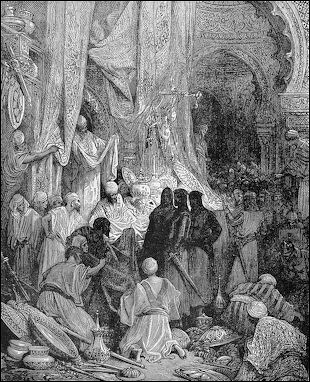
"Astonishment of the Crusaders at the Wealth of the East"
Usmah Ibn Munqidh wrote: “I entered the service of the just King Nur ad Din - God have mercy on him! - and he wrote to al-Malik as-Salih asking him to send my household and my sons out to me; they were in Egypt, under his patronage. Al-Malik as Salih wrote back that he was unable to comply because he feared that they might fall into Frankish hands. He invited me instead to return to Egypt myself: 'You know,' he wrote, 'how strong the friendship is between us. If you have reason to mistrust the Palace, you could go to Mecca, and I would send you the appointment to the governorship of Aswan and the means to combat the Abyssinians. Aswan is on the frontier of the Islamic empire. I would send your household and your sons to you there.' [Source: Source: Franceso Gabriell, “Arab Historians of the Crusades” (University of California Press, Berkeley, 1964]
“I spoke to Nur ad-Din about this, and asked his advice, which was that he would certainly not choose to return to Egypt once he had extricated himself. 'Life is too short!' he said. 'It would be better if I sent to the Frankish King for a safe-conduct for your family, and gave them an escort to bring them here safely.' This he did - God have mercy on him! - and the Frankish King gave him his cross, which ensures the bearer's safety by land and sea. I sent it by a young save of mine, together with letters to al-Malik as-Salih from Nur ad-Din and myself. My family were dispatched for Damietta on a ship of the vizier's private fleet, under his protection and provided with everything they might need.
“At Damietta they transferred to a Frankish ship and set sail, but when they neared Acre, where the Frankish King was - God punish him for his sins - he sent out a boatload of men to break up the ship with hatchets before the eyes of my family, while he rode down to the beach and claimed everything that came ashore as booty. My young slave swam ashore with the safe-conduct, and said: 'My Lord King, is not this your safe-conduct?' 'Indeed it is,' he replied, 'But surely it is a Muslim custom that when a ship is wrecked close to land the local people pillage it?' 'So you are going to make us your captives?' 'Certainly not.' He had my family escorted to a house, and the women searched. Everything they had was taken; the ship had been loaded with women's trinkets, clothes, jewels, swords and other arms, and gold and silver to the value of 30,000 dinar. The King took it all, and then handed five hundred dinar back to them and said: 'Make your arrangements to continue your journey with this money.' And there were fifty of them altogether! At the time I was with Nur ad-Din in the realm of King Mas'ud, at Ru'ban and Kaisun; compared with the safety of my sons, mu brother and our women,, the loss of the rest meant little to me, except for my books. There had been 4,000 fine volumes on board, and their destruction has been a cruel loss to me for the rest of my life.”
Image Sources: Wikimedia Commons
Text Sources: Internet Islamic History Sourcebook: sourcebooks.fordham.edu “World Religions” edited by Geoffrey Parrinder (Facts on File Publications, New York); “ Arab News, Jeddah; “Islam, a Short History” by Karen Armstrong; “A History of the Arab Peoples” by Albert Hourani (Faber and Faber, 1991); “Encyclopedia of the World Cultures” edited by David Levinson (G.K. Hall & Company, New York, 1994). “Encyclopedia of the World’s Religions” edited by R.C. Zaehner (Barnes & Noble Books, 1959); Metropolitan Museum of Art, National Geographic, BBC, New York Times, Washington Post, Los Angeles Times, Smithsonian magazine, The Guardian, BBC, Al Jazeera, Times of London, The New Yorker, Time, Newsweek, Reuters, Associated Press, AFP, Lonely Planet Guides, Library of Congress, Compton’s Encyclopedia and various books and other publications.
Last updated September 2018
